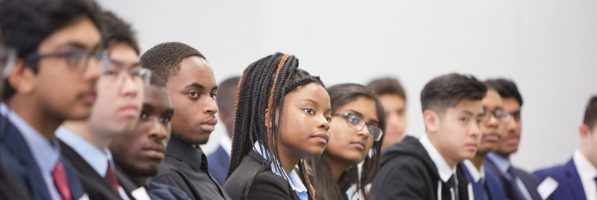Kellogg Investigates Impact of Automation on Smaller Cities, and More – Chicago News

Let’s explore some of the most interesting stories that have emerged from Chicago business schools this week.
How Will Automation Affect Different U.S. Cities? – Kellogg Insights
Northwestern University Kellogg School of Management‘s Hyejin Youn, an assistant professor of management and organization, just published new research in which she and her colleagues explore the unique industrial impacts of automation on different cities across the country.
Youn predicts that automation will have a more pronounced impact on smaller cities whose industries are populated by easily automated jobs (think card dealers, cashiers, and accountants). These cities are likely to experience a hollowed out middle class precipitated by “an exodus of workers, as well as exacerbated income inequality.”
According to the article, larger cities with greater “shares of managerial and knowledge professions (like lawyers, scientists, and software developers), [which] require knowledge and skills that cannot easily be taught to a machine, they will offset the total impact of automation.”
You can learn more about Youn’s research here.
More Than Jobs Than Job Seekers in Elkhart – Mendoza Ideas & News
Fox 26 Houston recently interviewed Notre Dame Mendoza College of Business finance professor Jason Reed about a fascinating discovery that there are “more job openings in Elkhart, Indiana, than there are workers to fill them.” According to recent Labor Department statistics, this news is indicative of the realities of many communities in the Midwest.
You can watch the entire interview below.
In many cities there are never too many job openings, but here’s one city where the economy is so good that there are more jobs than there are workers to fill them. Fox News’ @MattFinnFNC reports. pic.twitter.com/lwfBAhGaBz
— Ivory Hecker FOX 26 (@IvoryHecker) April 9, 2018
Are You Ready For Personalized Pricing? – Booth Business Blog
University of Chicago Booth School of Business professors Sanjog Misra and Jean-Pierre Dubé have published new research that many companies have begun exploring “personalized pricing” or tailoring their prices to individual customers—a practice that dates back at least 150 years to the days of haggling with Wanamaker’s sales staff but is relatively nascent in the era of Amazon.
According to the article, the researchers found that by “testing a range of introductory prices for online job board ZipRecruiter, the company could have more than doubled its standard price of $99, increasing revenues despite the smaller number of customers willing to pay more.”
The practice is not without potential controversy, as Dubé explains: “In markets where prices are transparent and customers can easily figure out what other people are paying, that’s where you run the risk of a backlash.”
Learn more about the duo’s research here.
The Connection Between Social Mobility and Democracy, and More – Chicago News

Let’s explore some of the most interesting stories that have emerged from Chicago business schools this week.
Is Social Mobility Essential to Democracy? – Kellogg Insights
Northwestern University Kellogg School of Management professor of managerial economics and decisions sciences Georgy Egorov, along with MIT Sloan’s Daron Acemoglu and Chicago Booth’s Konstantin Sonin, recently created a model to understand how voters’ beliefs about social mobility affect their political preferences.
Despite older generations becoming increasingly less optimistic with the potentially positive outcomes of future generations, the researchers find that there’s a decent probability that the children of future generations will rise to a higher economic and social class.
“Having many election cycles means that even with low mobility, the likelihood that a person’s decedents will eventually end up in another class is high. Egorov compares it to two lakes connected by a narrow straight. In the short term, they will not exchange much water. But over the long term, that small exchange will grow and grow until the waters are quite mixed.”
Speaking with Kellogg Insights, Egorov elaborated:
“In a certain sense, expectation of stability begets stability. A thick middle class makes democracy more stable than a thin one. Our research highlights the problems that may follow from a shrinking or thin middle class. Additionally, if the belief in the stability of democracy is undermined, people might well decide it’s not worth defending.”
You can read more about the trio’s research here.
Mendoza Marketing Professor Wins Research Award – Mendoza Ideas & News
The 2018 Louis W. Stern Award has officially been bestowed upon Shankar Ganesan, the John Cardinal O’Hara, C.S.C., professor of business and marketing department chair at the Notre Dame University Mendoza College of Business.
The award recognizes Ganesan, as well as co-authors Steven P. Brown of the University of Houston, Babu John Mariadoss of Washington State and Hillbun (Dixon) Ho of University of Technology Sydney for a 2010 article they published in the Journal of Marketing Research entitled, “Buffering and Amplifying Effects of Relationship Commitment in Business-to-Business Relationships.”
According to the article, “The paper examines the buffering and amplifying effects of relationship commitment on organizational buyers’ intentions to switch suppliers when a relationship is strained by the incumbent’s own misbehavior. “
Check out more from Ganesan’s research here.
The Road Ahead: Takeaways from Economic Outlook 2018 – Chicago Booth Magazine
Chicago Booth Magazine recently dove into the sold-out ‘Economic Outlook 2018’ event last January to “evaluate emerging trends [and] share their insights into the economic outlook for Wall Street and Main Street—ten years after the financial crisis.”
Randall S. Kroszner, the Chicago Booth Norman R. Bobins professor of economics, offered a few optimistic projections:
“I do think [the tax cut] is going to have a positive impact, both in the short run and the long run. I think the broad direction is fairly clear: cutting personal tax rates on a weighted average, of about three percent or so, will have positive impact on demand, because that’s going to allow for higher disposable income in the short run.”
Austan D. Goolsbee, Robert P. Gwinn professor of economics and the former chairman of the Council of Economic Advisers, offered slightly more tempered but optimistic projections as well:
“The danger areas continue to be worries about China, where there has been a big acceleration of debt, and a nagging feeling that we really don’t know what’s in the European financial institutions. That said, the overall growth around the world is looking a little better, for the first time in a little while.”
You can read more about Booth’s ‘Economic Outlook 2018’ overview here.
Chicago Booth Talks Suspect Stock Trading, and More – Chicago News

Let’s explore some of the most interesting stories that have emerged from Chicago business schools this week.
Why Do Investors Seek out Stock Swindles? – Chicago Booth Blog
The University of Chicago Booth School of Business (the new number one business school in the country according to U.S. News) recently published new research that uncovers an unfortunate gambling problem among some German investors who “buy suspect stocks for the thrill of it, even when they know better.”
Booth Professor Christian Leuz collaborated with Leibniz University of Hanover’s Steffen Meyer, Humboldt University of Berlin’s Maximilian Muhn, Harvard’s Eugene Soltes, and Goethe University of Frankfurt’s Andreas Hackehtal on a new working paper entitled, “Who Falls Prey to the Wolf of Wall Street? Investor Participation in Market Manipulation,” which examines “the German stock market, asking who invests in these schemes and how often.”
“Of these investors, 6,569 individuals—nearly 6 percent of the sample—took part in pump-and-dump schemes, investing an average 11.4 percent of their portfolio’s overall value and sustaining an average loss of nearly 30 percent.”
Read more about the quintet’s stock trading research here.
2018 MBA Chile Immersion – Mendoza College of Business Blog
Students from the University of Notre Dame Mendoza College of Business recently embarked on a five-day study abroad trip to Santiago, Chile, where they “toured some of the most innovative and philanthropic local businesses.” In early March, the group paid a visit to fruit producer Vista Hermosa, based in the Central Zone of Chile (Melipilla). Vista Hermosa’s mission is to “produce good quality fruit and have control of it from its harvest until it is shipped to different markets.” The company gives “special emphasis to the care of the environment, protecting the native flora and fauna, as well as the efficient use of fertilizers and agrochemicals.” According to one student testimonial:
“Our visit consisted of a tour of both the farm and the packing plant to better understand the production and fruit export process. There is a small church on the farm grounds available for the employees who live on the farm. We were treated to fresh pears and cherries, the latter of which is one of the farms biggest exports.”
You can read more about the Mendoza’s Chilean itinerary here and watch the student’s day one diary of the trip below.
Trying to Be Persuasive? Here’s What You Are Likely Doing – Kellogg Insight
Northwestern University Kellogg School of Management professor of marketing Derek Rucker and associate professor of management and organizations Loran Nordgren recently published new research that attempts to offer a glimpse into how “people use language in persuasion.” The duo found that “participants’ language tends to become more emotional when they are motivated to persuade others to buy a product.” Rucker elaborates:
“The gravity of emotional language is hard to escape, even when you know the audience wants to hear a more cognitive appeal. We observe that people express more emotion even in categories where that might be odd and potentially less effective. When it comes to influence, emotion is arguably the earliest form of communication we have.”
Check out more of the duo’s research here.
How Natural Disasters Can Turn into Economics Disasters – Chicago News

Let’s explore some of the most interesting stories that have emerged from Chicago business schools this week.
Localized Natural Disasters Can Hurt an Entire Country’s Economy – Kellogg Insight
Northwestern Kellogg School of Management associate professor of managerial economics and decision sciences Alireza Tahbaz-Salehi set out to understand the large-scale economic implications of natural disasters.
Tahbaz-Salehi worked with Vasco Carvalho of the University of Cambridge, Makoto Nirei of the Ministry of Finance of Japan, and Yukiko Saito of the Research Institute of Economy, Trade and Industry in Japan. After the 2011 earthquake, “disaster-affected firms’ connections to companies outside the regions affected by the quake had a strong effect: these links accounted for a 1.2 percent decline in Japan’s gross economic output the year after the disaster.”

The aftermath of the 2011 earthquake in Japan hurt economic productivity for a lengthy period of time. Photo via Reuters
Tahbaz-Salehi says, “If these shocks start propagating from a firm to its customers, to its customers’ customers, and so on, they may also have an aggregate effect on the entire economy. But there have been almost no empirical studies to document whether these effects exist and how big they are.”
You can read more from Kellogg Insight here.
Hitting Rock Bottom After Job Loss Can Be Beneficial – Mendoza College of Business
To paraphrase Beckett, “Try, fail, try again, fail again, fail better.” Notre Dame Mendoza College of Business‘ Siegfried professor of entrepreneurship Dean Shepherd recently co-authored a study in Academy of Management Review with Indiana University’s Trenton Williams, which finds that on the road to success, failure is often the most revealing option.
“On the way down, we frantically do all sorts of things to try and repair the situation, and suffer as they fail. Bottoming out frees us from the misconception that the problems can be fixed, and in the process, frees us from other constraints and negative emotions and provides the conditions necessary to find a viable solution.”
He continues:
“‘A failed corporate executive might consider a variety of other potential roles,’ Shepherd says. ‘For example, sitting on the board of a nonprofit organization that is desperate for experienced managerial guidance, exploring government positions or running for office, working with startups, and so forth. Similarly, a failed entrepreneur might explore how skills learned in starting a business could be applied in a corporate setting, take standardized exams to be considered for law school or engage in other low risk exploration activities. In these cases, hitting rock bottom opens up myriad new opportunities.’”
Read more about the duo’s research here.
Would You Pay $20 a Day to Lease a Luxury Car? – Booth School of Business
University of Chicago Booth School of Business associate professor Daniel Bartels and the University of Rhode Island’s Stephen Atlas are scheduled to publish a new study in the Journal of Consumer Research entitled, “Periodic Pricing and Perceived Contract Benefits,” which finds that people “perceive more benefits from their purchases if they make payments on a periodic basis.”

Research from Booth shows that people feel their purchases are more valuable if its paid off in repeated cycles. Photo via NY Auto Show.
“Our framework and results suggest that periodic pricing can help people appreciate the benefits they accrue from a purchase. So, under the right conditions, marketers can encourage purchase with periodic pricing, even for significant sums of money.”
Read more about the duo’s research here.
Misty Johnson Named Business Dean – DePaul Driehaus College of Business and Kellstadt Graduate School of Business
As of March 1, the Driehaus College of Business and Kellstadt Graduate School of Business formally introduced its newest business college dean, Misty Johnson, Ph.D.
Johnson became the interim dean of the business college back in July, replacing former dean Ray Whittington. With her role now official, she has become the first-ever female dean of DePaul’s business school.
“Dr. Johanson has done a laudable job, and I’m pleased the college will continue to benefit from her leadership and expertise,” DePaul University Provost denBoer said in a press release.
“During her tenure this academic year, fall graduate business enrollment increased 16 percent; staff roles were reimagined to enhance the student experience; master’s program and center directors began collaborating more closely to support graduate program success, and the college forged stronger industry connections to support career opportunities. Johanson also launched a campaign with the Office of Advancement to raise $4 million for the college by the end of the academic year and exceeded the goal within the first six months.”
You can read more about the official appointment of Dr. Johnson here.
Chicago News: Northwestern on Bitcoin, Notre Dame Explores Psychopathy and More

Let’s explore some of the most interesting stories that have emerged from Chicago business schools this week.
New Cryptocurrencies, Same Old Problems – Kellogg Insight
Following Bitcoin’s record high $19,511 BPI at the end of 2017, which has already begun its slow steady decline (its BPI is around $10,800 as of Feb 19), folks outside the standard-issue Silk Road users and modern-day gold prospectors have begun to openly (and loudly) question whether we’re due for a global cryptocurrency takeover. Northwestern University Kellogg School of Management professor Sarit Markovich advises eager beavers to slow their rolls:
“There are certainly huge advantages to blockchain technology, especially when it comes to cross-border transactions. But I doubt we’re going to reach the point where decentralized cryptocurrencies replace cash or distributed ledgers replace central banks. There’s too much room for manipulation. Instead, it looks like the real innovation will occur within large institutions, which is not exactly democratization.”
Markovich goes on to note another problem with the current state of Bitcoin, which is the preponderance of “whales” mining the currency. He explains:
“In addition to ‘mining pools,’ there is also the problem of ‘whales:’ roughly 1,000 people own around 40 percent of all bitcoins. As the market continues to rise, there is a risk that some may be in a position to manipulate the market. For example, they could collude in an effort to drive the price of Bitcoin up, then cash out all at once—and perhaps even bet against the futures market.”
Read more about the future of cryptocurrency here.
Psychopaths Tend to Benefit and Flourish Under Abusive Bosses – Mendoza Ideas & News
Got a boss from H-E-double hockey sticks? You’re not alone. But what might make you unique is your ability to stand heat. It turns out some folks actually do quite well under cruel conditions. It also turns out that these folks might have more in common with Richard Ramirez or John Wayne Gacy than they’d care to admit, according to a new study by Notre Dame Mendoza College of Business assistant professor of management Charlice Hurst:
“We found that primary psychopaths benefit under abusive supervisors. Relative to their peers low in primary psychopathy, they felt less anger and more engagement and positive emotions under abusive supervisors.” “It may reward and retain exactly the kind of people who are likely to perpetuate abusive cultures,” she says. “Psychopaths thriving under abusive supervisors would be better positioned to get ahead of their peers.”
Hust continues, saying:
“If they have a problem of endemic abuse, like Wells Fargo — where former employees have reported that managers used tactics designed to induce fear and shame in order to achieve unrealistic sales goals—and upper-level managers are either unaware of it or are not taking action, they might notice increasing levels of engagement due to turnover among employees low in primary psychopathy and retention of those high in primary psychopathy. At the extreme, they could end up with a highly engaged workforce of psychopaths.”
Read more about Dr. Hurst’s research, entitled “Are ‘Bad’ Employees Happier Under Bad Bosses? Differing Effects of Abusive Supervision on Low and High Primary Psychopathy Employees,” here.
Financial Compensation Can Distract From Emotional Suffering – Chicago Booth Review
University of Chicago Booth School of Business professor Christopher Hsee, Northwestern professor Xueer Yu and Ph.D. candidate Shirley Zhang recently explored the complex analysis required to compensate victims who suffer grave psychological, physical, and financial duress.
What the trio found, surprisingly, is that psychological and physical distress was often much more rewarding than financial damage. And even mentioning financial damage, coupled with psychological and physical damage, often hindered compensation.
The reason? Financial damage is generally empirical and can be exacted with ease.
“It would be better to say ‘I was so scared that I lost two nights’ sleep’ than to say ‘I was so scared that I lost two nights’ sleep and one day’s work,’” the researchers write. “If the victim mentions one day’s work, the mediator would likely compensate the victim for only her one day’s pay. If the victim does not mention one’s day work, the mediator would likely award more, unless the victim has a high-paying job and the judge is aware of it.”
Read more about their research, recently published in the January issue of Organizational Behavior and Human Decision Processes, here.
